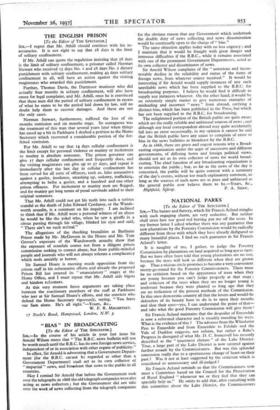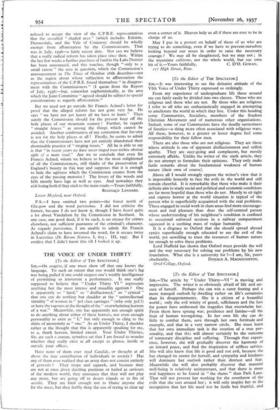NATIONAL PARKS [To the Editor of THE SPECTATOR.]
Snt,—The banter and flattery, which Sir Francis Acland mingles with such engaging charm, are very seductive. But neither shall siren lure nor good red herring put me off the scent. In my former letter I asked whether there was any guarantee that new plantations by the Forestry Commission would be radically different from those with which they have already disfigured so many beautiful places. I find no such guarantee in Sir Francis Acland's letter.
It is naughty of me, I gather, to judge the Forestry Commission by plantations on land acquired so long ago as 192o. But we have often been told that young plantations are no test, because the trees will look so different when they are grown up. Thus a vicious circle promises to become a very convenient merry-go-round for the Forestry Commissioners. There must be no criticism based on the appearance of trees when they are young because you can't judge properly at that stage ; and criticism of the trees when they are no longer young is irrelevant because they were planted so long ago that they are no indication of the present methods of the Commission. In this once democratic country all that the lovers and would-be defenders of its beauty have to do is to open their mouths and shut their eyes—yes, I can understand the point of that— and take what the good Forestry Commission will give them !
Sir Francis Acland maintains that the despoiler of Ennerdale is now a reformed character and is steadily mending his ways. What is the evidence of this ? The advance from the Whinlatter Pass to Ennerdale and from Ennerdale to Eskdale and the Vale of Duddon suggests, not reform, but rather a Rake's Progress in disregard of what Mr. D. C. Somervell has recently described as the " innermost shrines " of the Lake District. True, a large part of the Lake District is now secured against further assault by the Commissioners. But was this splendid concession really due to a spontaneous change of heart on their part ? Was it not at least suggested by the criticism which is considered so unnecessary and ill-judged ?
Sir Francis Acland reminds us that the Commissioners now meet a Committee based on the Council for the Preservation of Rural England " whenever we or they feel that they can specially help us." He omits to add that, after consulting with this committee about the Lake District, the Commissioners
refused to accept the view of the C.P.R.E. representatives that the so-called " shaded area " (which includes Eskdale, Dunnerdale, and the Vale of Coniston) should be wholly exempt from afforestation by the Commissioners. That was in July, 1936—a fairly recent date. Nor can we believe that a really radical reform has taken place since then. Within the last few weeks a further purchase of land in the Lake District has been announced, and this touches, though " only to a small extent " the area in question, which the Commission's announcement in The Times of October 16th describes—not as the region about whose subjection to afforestation the representatives of the C.P.R.E. found themselves " in disagree- ment with the Commissioners " (I quote from the Report of July, 1936)—but, somewhat euphemistically, as the area which the Joint Committee " agreed should be subject to special considerations as regards afforestation."
But we need not go outside Sir Francis Acland's letter for proof that the alleged reform has not gone very far. He says " we have not yet learnt all we have to learn." Then surely the Commission should for the present keep off the holy places of our mountain scenery ! Further, he regards " straight fences " as among the things which cannot be avoided. Another confirmation of my contention that forestry is not for the holy places at all ! Finally, he seems to admit that the Commissioners have not yet entirely abandoned their abominable practice of " ringing treees." All he is able to say is that "in recent years we have never ringed trees within obvious sight of a main road." Are we to conclude that even Sir Francis Acland, whom we believe to be the most enlightened of all the Commissioners, still thinks of the preservation of England's beauty in this way and supposes that it is enough to hide the ugliness which the Commission creates from the eyes of the passing motorist ? The lovers of the woods and hills mostly have legs as well as eyes. And nowadays they risk losing both if they stick to the main roads.—Yours faithfully,
REGINAI.D LENNARD.
Lower Heyford, near Oxford.
P.S.—I have omitted two points—the forest north of Glasgow and the word parvissima. I did not criticise the former, because I do not know it, though I have heard quite a lot about Vandalism by the Commission in Scotland. In any case, one good deed, if it be such, is no excuse for crimes elsewhere, nor sufficient guarantee of the criminal's character. As regards parvissima, I am unable to admit Sir Francis Acland's claim to have invented the word, for it occurs twice in Lucretius (De Rerum Natura, 1, 615 ; III, 199). But I confess that I didn't know this till I looked it up.















































 Previous page
Previous page